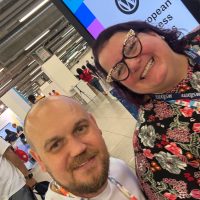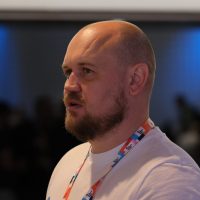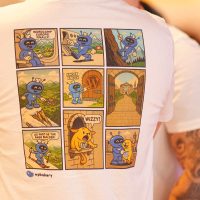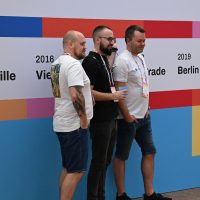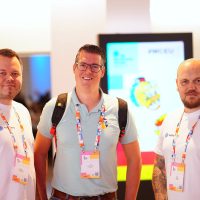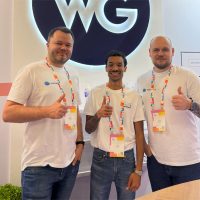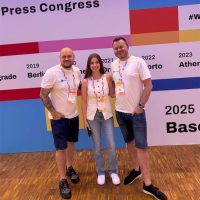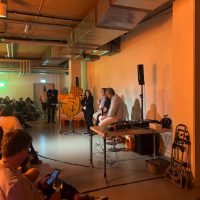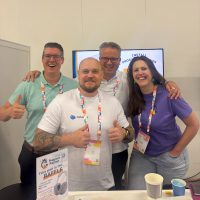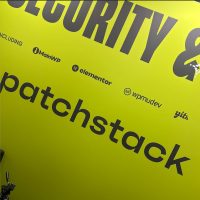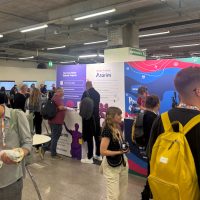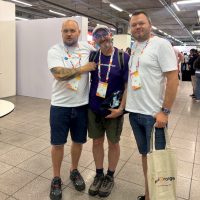From Connections to Collaborations: WordCamp Europe 2025 Insights
I’ve always loved attending WordCamps. They’ve consistently been about people – the community, the contributors, the stories shared over coffee (and sometimes beer). But this year in Basel, something felt different.
The community spirit was still strong – Contributor Day was buzzing with familiar energy and generosity. But what stood out to me most wasn’t the number of talks or the volume of swag. It was the shift in mindset. This year, WordCamp felt more focused on collaborations – on building real, meaningful partnerships, both on a technical level but also commercially.
My colleague Edgars Veidenbaums, WPBakery’s Development Manager, also attended and shared the same perspective on the event.
WordCamp Europe in Basel was another great experience, living up to the community's high standards. The city was clean and pleasant, though it felt like attendance was down a bit compared to previous years. That might be partly due to the ongoing discussions within the WP community (WP Drama) and the relatively high cost of visiting Switzerland. Still, the quality of networking was excellent – perhaps even better than before. I connected with many new people this time, more than in earlier years, and I believe these new contacts could lead to some exciting partnerships. Looking ahead, next year’s WCEU in Poland has the potential to be a big one.
Talking Partnerships – Looking Inside and Outside the Ecosystem
Throughout the event, I had the chance to speak with amazing people from Amelia, Progress Planner, Crocoblock, InstaWP, Atarim, Seahawk Media, GoDaddy, and many others. And something became very clear: there’s a shared appetite for collaboration.
We’re not just talking about WordPress-to-WordPress partnerships anymore. Many of us are looking outward – toward SaaS platforms, vertical tools, integrations, and industry niches that take us beyond the traditional boundaries of the ecosystem. That’s where the next phase of growth may be.
The FAIR initiative is also something I’ve got my eye on. It’s ambitious and challenging, no doubt. But it could evolve into something powerful. For now, there are more questions that answers – I explain more about FAIR below.
On a related note, it’s been refreshing to see some of the drama that’s shadowed the community in the past – particularly between Matt Mullenweg / Automattic and WP Engine – start to ease. It feels like we’re moving toward more constructive conversations, and that’s a good thing for all of us.
WordCamp Europe 2025 in Pictures
We took some photos during the event. Mostly of people we met, but also trying to capture the mood.
If you took any photos of us please share them on social media and let us know!
Is the Future of WordPress AI? Let’s Make Sure It Works for Everyone
It’s impossible to talk about 2025 without mentioning AI. It’s no longer hype. It’s real. It’s shaping how we work, create, and engage online – and WordPress is no exception.
That’s why I’m genuinely excited to see the WordPress project forming an AI team. It’s a big step, and a necessary one. But as we push forward, I think we need to stay grounded: AI needs to work for everyone in the ecosystem – from the solo freelancer building client sites to large plugin businesses and agencies.
At the same time, I’m reminded that the so-called “legacy” way of building WordPress sites – using page builders, themes, and plugins – is still going strong. And honestly, that’s where a lot of AI-powered improvements can make the biggest difference. It’s not about replacing that model – it’s about enhancing it. Making it faster, smarter, and more accessible.
One area I find particularly exciting is agentic AI – systems made up of autonomous agents that can reason, plan, and execute complex tasks. This ties into the MCP model (Multi-Component Platform) – the idea that intelligent digital systems will increasingly be composed of interoperable components, services, and interfaces that work together to accomplish goals.
WordPress, with its vast ecosystem of plugins, APIs, and integrations, is uniquely positioned to play a central role in this kind of setup. Imagine AI agents that can spin up a site, install and configure plugins, generate content, integrate external tools, and optimize performance – all in collaboration with human creators. WordPress doesn’t need to be a legacy tool in this future – it can be a foundational layer. Not only is a decentralized CMS like WordPress compatible with the model, it can have an important role to ensure the future of AI is not about making closed, propriety systems smarter and stickier.
But only if we build it that way – together, and in an open way.
FAIR: A Technically Ambitious but Promising Step Forward
One of the more talked-about topics at WordCamp Europe this year was the FAIR initiative (Fair Plugin Management on GitHub). While it’s still early days, FAIR has already sparked genuine curiosity and debate within the ecosystem – and for good reason.
At its core, FAIR is trying to tackle a long-standing challenge: how WordPress products are discovered, installed, and managed across the web. It proposes a decentralized package manager for WordPress themes and plugins – one that isn’t limited to a single marketplace or gatekeeper, but instead empowers developers and users alike with more transparency, autonomy, and flexibility.
Technically, it’s ambitious. Setting up a new, federated distribution model that maintains compatibility, security, and ease-of-use will be hard. But the very fact that it’s generating buzz is encouraging. It’s been a while since we’ve seen this kind of infrastructure-level innovation in the WordPress space.
For theme authors, FAIR could be especially impactful. Right now, theme distribution is tightly coupled with marketplaces or WordPress.org. That centralization can limit innovation, monetization flexibility, and visibility. A FAIR-powered model would allow theme developers to:
- Distribute directly while maintaining versioning, metadata, and trust signals.
- Bypass traditional gatekeepers, making it easier to test new business models.
- Integrate with other tools and platforms, opening up paths for cross-ecosystem exposure.
In short, FAIR may help re-level the playing field – giving more power back to creators without sacrificing user experience. That’s the idea.
Whether or not it becomes widely adopted, FAIR has already done something valuable: it has reignited optimism and ambition around the technical future of WordPress. And that’s a win in itself.
I would also add that FAIR is an example of the types of partnerships that we’ll see more of. Addressing internal pain points, so to speak, but also opportunities outside the WordPress bubble. If we come together on big, structural and innovative projects, even partnering with other Open Source initiatives, we’re stronger than then closed systems that we compete against.
So, What Now?
For me – and for us at WPBakery – the goal now is simple: turn WordCamp energy into execution.
We’ve already started expanding our partnership efforts. Conversations have turned into plans. And while nothing replaces face-to-face interactions, the real value of these connections will be measured in what we build together over the next few months.
WordCamp Europe 2025 reminded me of what’s possible when community and business align. Now it’s time to do the work.
We will also be heading to WordCamp Kraków, and I’m looking forward to continuing these conversations – about AI, FAIR, partnerships, and how we grow beyond the WordPress bubble. If you’ll be there and want to chat, let’s connect!
